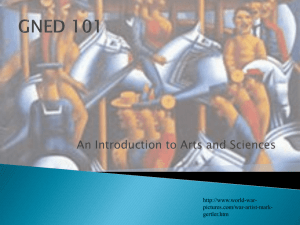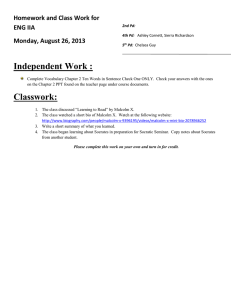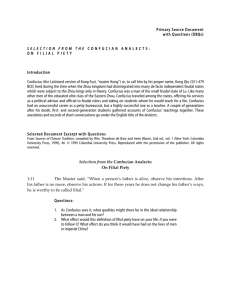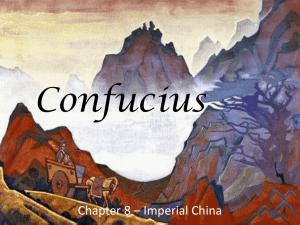Activity 5. Socrates and Confucius Discuss Responsibility and Authority Instructions:
advertisement
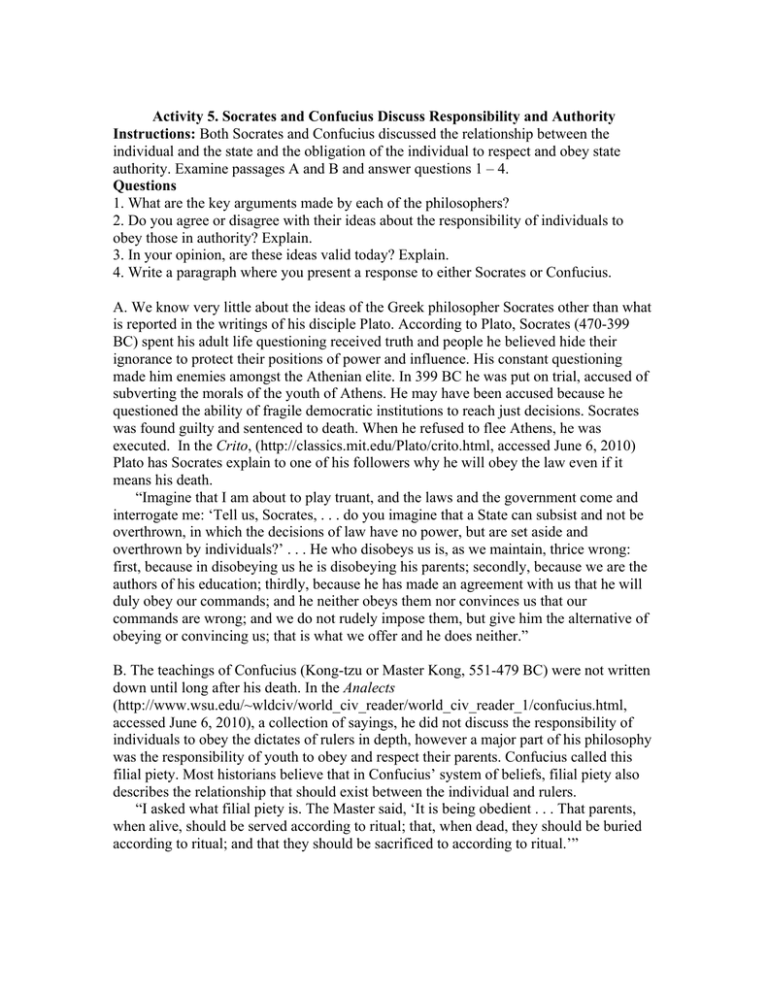
Activity 5. Socrates and Confucius Discuss Responsibility and Authority Instructions: Both Socrates and Confucius discussed the relationship between the individual and the state and the obligation of the individual to respect and obey state authority. Examine passages A and B and answer questions 1 – 4. Questions 1. What are the key arguments made by each of the philosophers? 2. Do you agree or disagree with their ideas about the responsibility of individuals to obey those in authority? Explain. 3. In your opinion, are these ideas valid today? Explain. 4. Write a paragraph where you present a response to either Socrates or Confucius. A. We know very little about the ideas of the Greek philosopher Socrates other than what is reported in the writings of his disciple Plato. According to Plato, Socrates (470-399 BC) spent his adult life questioning received truth and people he believed hide their ignorance to protect their positions of power and influence. His constant questioning made him enemies amongst the Athenian elite. In 399 BC he was put on trial, accused of subverting the morals of the youth of Athens. He may have been accused because he questioned the ability of fragile democratic institutions to reach just decisions. Socrates was found guilty and sentenced to death. When he refused to flee Athens, he was executed. In the Crito, (http://classics.mit.edu/Plato/crito.html, accessed June 6, 2010) Plato has Socrates explain to one of his followers why he will obey the law even if it means his death. “Imagine that I am about to play truant, and the laws and the government come and interrogate me: ‘Tell us, Socrates, . . . do you imagine that a State can subsist and not be overthrown, in which the decisions of law have no power, but are set aside and overthrown by individuals?’ . . . He who disobeys us is, as we maintain, thrice wrong: first, because in disobeying us he is disobeying his parents; secondly, because we are the authors of his education; thirdly, because he has made an agreement with us that he will duly obey our commands; and he neither obeys them nor convinces us that our commands are wrong; and we do not rudely impose them, but give him the alternative of obeying or convincing us; that is what we offer and he does neither.” B. The teachings of Confucius (Kong-tzu or Master Kong, 551-479 BC) were not written down until long after his death. In the Analects (http://www.wsu.edu/~wldciv/world_civ_reader/world_civ_reader_1/confucius.html, accessed June 6, 2010), a collection of sayings, he did not discuss the responsibility of individuals to obey the dictates of rulers in depth, however a major part of his philosophy was the responsibility of youth to obey and respect their parents. Confucius called this filial piety. Most historians believe that in Confucius’ system of beliefs, filial piety also describes the relationship that should exist between the individual and rulers. “I asked what filial piety is. The Master said, ‘It is being obedient . . . That parents, when alive, should be served according to ritual; that, when dead, they should be buried according to ritual; and that they should be sacrificed to according to ritual.’” “The duties of universal obligation are five . . . The duties are those between ruler and subject, between father and son, between husband and wife, between elder brother and younger, and those in the intercourse [interaction] of friends.” “It is rare for a man whose character is such that he is good as a son and obedient as a young man to have the inclination to transgress against his superiors; it is unheard of for one who has no such inclination to be inclined to start a rebellion . . . Being good as a son and obedient as a young man is, perhaps, the root of a man’s character.”
